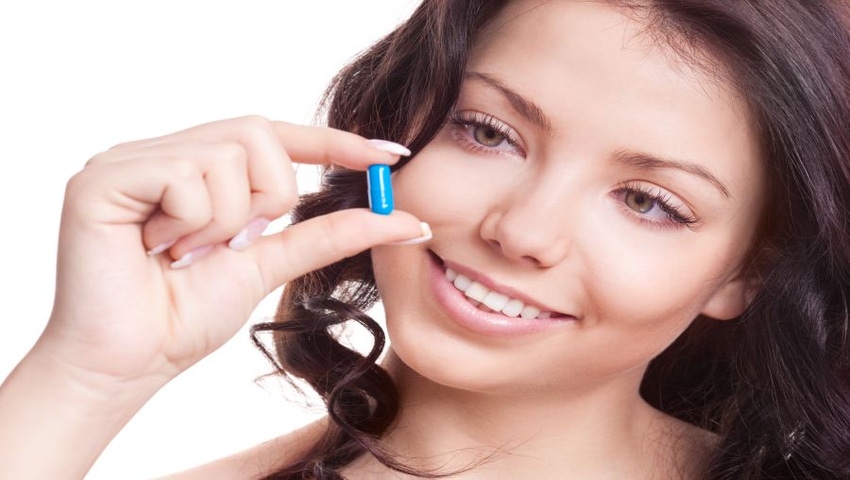Nutrients for Beauty from the Inside Out
Antioxidants can help reduce wrinkles, increase skin firmness and reduce the stressors brought on by lifestyle choices, all which help consumers improve their appearance.

The ravages of time and bad habits can significantly contribute to increasing the rate at which skin cells age. Sags, wrinkles and age spots associated with aging are caused by everything from high-sugar diets to high stress levels, too little sleep and poor nutrition. Environmental factors also increase the rate of skin aging, including excessive sun exposure, wind and extremes of hot and cold. Premature aging of the skin, however, is not inevitable.
Interventions like plastic surgery and chemical injections, though they may have some cosmetic benefit, can have problematic outcomes in terms of results or side effects, and only address surface issues rather than the cause at a cellular level.
In fact, less invasive alternatives can support skin tone, elasticity and resilience, even in skin that has already aged excessively. Targeted support has shown remarkable biological benefits in skin appearance through natural ingredients that support and restore the structure and function of the skin from the inside out. These ingredients support healthy skin function by promoting detoxification systems, and strengthening skin proteins and connective tissue. They also support the skin’s hydration capabilities.
Antioxidants control age and wrinkle-inducing oxidative stress in the skin cells and tissues. The mineral antioxidants zinc and copper support the biosynthesis of the antioxidant skin-protecting enzyme super oxide dismutase (SOD) and the trace mineral selenium supports the production of the skin-healthy antioxidant glutathione peroxidase.¹
Healthy skin tone, function and detoxification can be supported by vitamin C, the water-soluble antioxidant and vitamin E, the fat-soluble antioxidant. The sulfur containing amino acid N-acetyl cysteine and glutathione powerfully support the skin’s natural antioxidant capabilities and detoxification for healthy skin structure. The exceptional plant antioxidants in green tea, turmeric, grapeseed extract, resveratrol and quercetin support healthy skin tone and elasticity.1
In an April 2007 study, it was found that “antioxidants may be beneficial to reduce free radical damage in the skin to modulate the balance of lipid inflammatory mediators and are useful in the treatment of inflammatory skin disorders.”² Specifically cited in this study were antioxidants grapeseed extract, vitamin C, vitamin E and zinc.
The journal Phytomedicine reported on a randomized, placebo-controlled, double-blind, split-face study in November 2007 on the clinical efficacy of turmeric, as well as DMAE (dimethylaminoethanol) on skin firmness, and found the combination treatment “improved skin firmness and elasticity in photoaged skin by evaluating skin firmness and elasticity using the speed of propagation of ultrasound shear waves in the skin as endpoint. A significantly reduced propagation speed indicated increased firmness.”3, 4, 5
Nutrients can positively affect the rate of skin aging by supporting healthy sugar metabolism. Creating this balance can support youthful, radiant skin by positively affecting the rate of skin aging. The B vitamin biotin plays an essential role in balanced carbohydrate and sugar metabolism and the fat-soluble form of vitamin B1, benfotiamine, reduces the rate of glycation, producing positive changes in the rate of wrinkling and skin stress associated with it.6
Healthy management of stress and the stress hormones is essential for optimal skin health and vitality. Excessive stress, or a reduced capacity to manage the stress hormones, can significantly increase the rate of skin aging. Excessive levels of stress hormones can age the skin at a rapid rate. We’ve all known individuals whose skin has appeared to age more drastically than their chronological age after a period of high stress. The B complex vitamins, specifically vitamin B2, vitamin B6 and vitamin B5 or pantothenic acid, play essential roles in supporting the metabolism to more effectively manage the effects of internal or external stresses by improving the adaptation to and recovery from stressful events—in turn supporting a healthier balance of the stress hormones.7, 8
Sunlight, though it is essential for good health, can also rapidly speed the aging of the skin through excessive oxidative stress and the formation of toxic free radicals. Vitamin D3, the sunshine vitamin, can reduce excessive oxidative skin stress from sunlight exposure and support healthy skin structure and function.9
Support of the collagen skin proteins can help maintain a youthful vibrancy and elasticity to the skin structures. The amino acids proline and lysine and the mineral silica improve and support collagen protein synthesis and aid in maintaining healthy collagen integrity for a more youthful appearance to the skin. The herbal extracts from gotu kola and hawthorn berry also support healthy skin collagen formation.10
Silica also increases the rate of collagen protein production and supports skin antioxidant protection. In addition, silica supports the integrity of the collagen proteins by reducing the rate of collagen breakdown.11
Methylsulfonylmethane (MSM) supplies vital sulfur compounds that contribute to healthy collagen protein stability, supports healthy skin detoxification and protects the skin from the negative effects of excessive oxidative free radical stress.12
The many muscles that make up the face and neck have a large role in maintaining a youthful tone and skin appearance. DMAE is a direct precursor to acetylcholine, and gives strength, tone and resilience to the muscles. Research that evaluated the effects of DMAE formulations on human skin found that “DMAE-supplemented formulation led to increased dermal thickness and also induced increase in collagen fiber thickness, suggesting DMAE action is related to its effects on the dermis and showed hydration effects on the skin.”13
Featured on WebMD in August 2006, Charlotte Grayson Mathis, M.D., referred to DMAE as a powerful antioxidant, stating, “This nutrient has one of the strongest appetites for free radicals. It works mostly by deactivating their power to harm skin cells. It also helps stabilize the membrane around the outside of each cell so that assaults from sun damage and cigarette smoke are reduced.”
Proper hydration of the skin tissues contributes to optimal health and function of the skin cells to maintain a youthful metabolism, elasticity, tone and detoxification. Sodium hyaluronate is a mucopolysaccharide that supports cellular hydration, especially in the skin and connective cells, which can also directly support healthy skin tone, elasticity and a healthy fullness to the skin tissues.14
Jack Grogan is chief science officer for Uckele Health & Nutrition. He is a recognized expert in hair mineral analysis, a valuable tool in determining the causes of nutritional imbalances or deficiencies. With considerable experience in the fields of biology, biochemistry and nutrition, he has been influential in the development of hundreds of proprietary nutritional formulas and programs.
1) Miyachi Y, Imamura S, Niwa Y. “Decreased skin superoxide dismutase activity by a single exposure of ultraviolet radiation is reduced by liposomal superoxide dismutase pretreatment.” J Invest Dermatol. 1987 Jul;89(1):111-2.
2) Skovgaard GR, Jensen AS, Sigler ML. “Effect of a novel dietary supplement on skin aging in post-menopausal women.” Eur J Clin Nutr. 2006 Oct;60(10):1201-6.
3) Ichihashi et al. “Glycation Stress and Photo-Aging in Skin.” Anti-Aging Medical Research Center and Glycation Stress Research Center, Graduate School of Life and Medical Sciences (August 2011).
4) Hitoshi M. “Role of antioxidants in the skin: Anti-aging effects.” Journal of Dermatological Science. 2010;58(2):85-90.
5) Sommerfielf B. “Randomized, placebo-controlled, double-blind, split-face study on the clinical efficacy of herbal extracts on skin firmness.” Phytomedicine. 2007;14(11):711-5..
6) Pugliese P. “Physiology of the Skin: The Impact of Glycation on the Skin, Part 2.” Skin Inc (April 2009).
7) Sapolsky RM, Krey LC, McEwen BS. “The neuroendocrinology of stress and aging: the glucocorticoid cascade hypothesis.” Endocr Rev. 1986 Aug;7(3):284-301.
8) Dhabhar FS. “Acute stress enhances while chronic stress suppresses skin immunity. The role of stress hormones and leukocyte trafficking.” Ann N Y Acad Sci. 2000;917:876-93.
9) Rijnkels J et al. “Photoprotection by antioxidants against UVB-radiation-induced damage in pig skin organ culture.” Radiat Res. 2003 Feb;159(2):210-7.
10) Dioguardi F. “Nutrition and skin. Collagen integrity: a dominant role for amino acids.” Clin Dermatol. 2008 Nov-Dec;26(6):636-40. DOI: 10.1016/j.clindermatol.2007.09.004.
11) Howard, Diana MD. “What Causes Skin Aging?” The International Dermal Institute (2009 - 2011).
12) Offord EA et al. “Photoprotective potential of lycopene, beta-carotene, vitamin E, vitamin C and carnosic acid in UVA-irradiated human skin fibroblasts.” Free Radic Biol Med. 2002 Jun 15;32(12):1293-303.
13) Tadini K, Campos P. et al. “In vivo skin effects of a dimethylaminoethanol (DMAE) based formulation.” Pharmazie. 2009 Dec;64(12):818-22.
14) Hoshida K et al. “Clinical Effects of Dietary Hyaluronic Acid on Dry, Rough Skin.” Aesthetic Dermatology. 2002;12:109-120.
About the Author(s)
You May Also Like






.png?width=800&auto=webp&quality=80&disable=upscale)